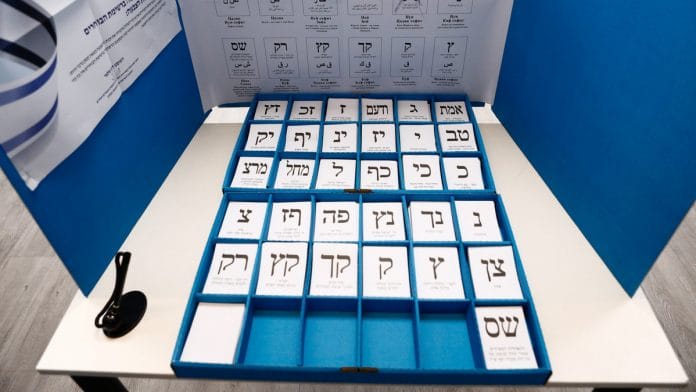Jerusalem/ Tel Aviv: Benjamin Netanyahu’s gamble to hold elections for a second time this year backfired after a stunning deadlock left Israel rudderless and convulsed by a new wave of political turmoil.
The inconclusive race against his centrist rival, former military chief Benny Gantz, dealt a tough blow to Israel’s longest-serving prime minister. At best, he’ll return to office badly weakened at a time when Israel’s diplomatic and security challenges are mounting and the Trump administration prepares to present its Middle East peace plan. At worst, he’ll be forced from power and rendered more vulnerable to prosecution on corruption charges.
With 81 per cent of ballots counted as of 11:20 a.m., Netanyahu’s nationalist Likud slightly trailed former military chief Benny Gantz’s centrist Blue and White, with 26.9% of the vote to 27.3 per cent. Neither party has the backing of 61 of parliament’s 120 lawmakers, according to Israeli media, leaving each to reach out to other potential governing partners.
The political horsetrading will be feverish in coming days as Netanyahu and Gantz jockey to line up the most support. There’s also pressure for their parties to join forces in a national unity government, a move that might require Netanyahu to step aside or be forced out.
“The results here are less good for him than in April; and in April he didn’t make a government,” Simon Davies, a pollster and political consultant for Number 10 Strategies, said of Netanyahu. “Bibi is a consummate politician, though, and you’d never put it past him to get out of any situation.”
The shekel didn’t react strongly to the results, appreciating 0.1 per cent to 3.5431 shekels per dollar.
“The main focus of the current elections was not on the economic agenda,” said Gil Bufman, Bank Leumi Le-Israel chief economist. “It was primarily on the future of the current prime minister. The impact on the economy is indirect and therefore secondary.”
Presidential Tap
After a near-final tally is released Thursday, President Reuven Rivlin will consult with the various parties to see whom they recommend he ask to form the next government. Coalition talks could take as long as six weeks.
Netanyahu engineered the revote after failing to form a coalition following the April 9 election, rather than give Gantz a try to build a government. With his political survival at stake, he launched a rancorous campaign that painted liberals and Israeli Arabs as bogeymen, and appealed to his nationalist base by vowing to annex West Bank territory the Palestinians want for a state.
But these tactics, which worked for him in the past, fell short this time. The leader of the Joint List of Arab parties, Ayman Odeh, said the venom galvanized Arab voters to go to the polls. Poised to become parliament’s third-largest faction, the Joint List said it will sit down with Gantz to see if they can cooperate. The Arab parties represent about 20% of Israel’s population but historically haven’t taken part in governing coalitions because they reject Israel’s identity as the Jewish state.
Former Defense Minister Avigdor Liberman, an on-again, off-again Netanyahu ally, is in a good position to become kingmaker. Liberman’s objection to military draft exemptions for ultra-Orthodox Jewish men led to the collapse of coalition talks after the last election, and his tough stand resonated among voters on both left and right in a country where conscription is otherwise compulsory. He’s been the most vocal champion of a national unity government that freezes out the ultra-Orthodox.
A defiant Netanyahu told cheering supporters at Likud headquarters in Tel Aviv that he would enter into negotiations with prospective coalition partners to form “a strong Zionist government” and block the formation of a “dangerous, anti-Zionist government” that would rely on the support of the Joint List. The crowd chanted, “Bibi, king of Israel,” and “We don’t want unity.”
Political newcomer Gantz ran a clean-hands campaign that resonated with voters desperate for an alternative to Netanyahu. The prime minister has been in office since 2009, and served a first term in the 1990s before being unseated by another former military chief, Ehud Barak.
Gantz stopped short of declaring victory but told a cheering crowd that “polarization and divisions are behind us, and unity and reconciliation are ahead of us.” He vowed to work toward a national unity government, but has repeatedly said he won’t team up with Netanyahu while he faces corruption allegations.
The prime minister says the accusations were cooked up by left-wing opponents in cahoots with a press biased against him. Before coalition talks collapsed in May, he was promoting new legislation that would grant him immunity from prosecution as long as he’s in office. If Netanyahu loses this election fight, that option will fade and he’ll become more legally vulnerable.
In early October he’s scheduled to plead his case before Attorney General Avihai Mandelblit, who will decide whether to press bribery and fraud charges. Netanyahu is accused of accepting about $200,000 in gifts from wealthy friends and trying to win sympathetic press coverage by shaping rules to benefit media moguls.
The political uncertainty dovetails with renewed confrontations with Iran and its proxies in Syria, Lebanon and the Hamas-run Gaza Strip, and the expected release of the Trump administration’s Middle East peace plan. Israel’s political paralysis has already held up the presentation of the plan, which is facing an uphill struggle five years after Israeli-Palestinian peace talks stalled.
U.S. President Donald Trump has been one of Netanyahu’s most fervent allies, showering him with political gifts such as moving the U.S. embassy to Jerusalem and withholding funds from the Palestinians. Ahead of April’s election he recognized Israeli sovereignty over a section of the war-won Golan Heights — but that wasn’t enough to help Netanyahu over the top this time.- Bloomberg
Also read: PM Modi features in Netanyahu’s election campaign hoardings in Israel







The winning streak for politicians from the Right seems to be petering out. One hopes Trump is next.
Why?? Bibi will be back though.